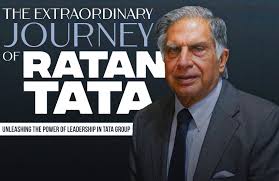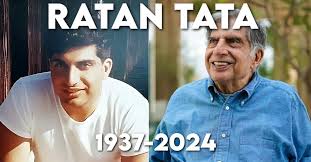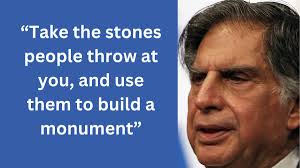
Ratan Tata is a name synonymous with visionary leadership, ethical business practices, and a commitment to philanthropy. Among his many accomplishments, the contribution of Mr. Ratan Tata towards social awareness stands out as a guiding light for responsible leadership in modern India. Born on December 28, 1937, in Bombay (now Mumbai), Ratan Naval Tata is one of India’s most revered industrialists. His life is a testament to perseverance, humility, and an unwavering belief in the potential of India and its people. Here’s the inspiring story of Ratan Tata, a man who transformed the Tata Group into a global conglomerate and continues to inspire millions.
Early Life and Education
Ratan Tata was born into the illustrious Tata family, a legacy deeply rooted in India’s industrial and philanthropic history. Nevertheless, he faced several challenges during his early life. His parents, Naval Tata and Sonoo Tata, separated when he was just ten years old. Following the separation, his grandmother, Lady Navajbai Tata, took on the responsibility of raising Ratan and his younger brother, Jimmy. Significantly, she played a pivotal role in shaping their values and character.
Regarding his education, Ratan Tata completed his schooling at Campion School and Cathedral and John Connon School in Mumbai. Subsequently, he went to the United States, where he earned a degree in Architecture from Cornell University in 1962. Later, he pursued the Advanced Management Program at Harvard Business School in 1975. Undoubtedly, his time abroad broadened his perspective and laid the foundation for his future endeavors.
Early Career and Entry into Tata Group
Ratan Tata’s journey with the Tata Group began in 1962 when he joined Tata Steel’s Jamshedpur plant as a trainee. This humble start at the shop floor, shoveling limestone and handling furnaces, was a deliberate move to understand the intricacies of the business from the ground up. It reflected his belief in leading by example and earning respect through hard work.
In 1971, the Tata Group appointed Ratan Tata as the Director-in-Charge of the National Radio and Electronics Company Limited (NELCO), a struggling company at the time.Despite his efforts to revive the business, external challenges, including labor issues and economic instability, led to limited success. However, this experience taught Ratan Tata invaluable lessons in resilience and crisis management.
Leadership of the Tata Group
Ratan Tata’s true test came in 1991 when he succeeded J.R.D. Tata as the Chairman of the Tata Group. At the time, the group was a collection of disparate companies, each operating autonomously. One of his first moves was to streamline operations and bring all Tata companies under a unified brand.
Ratan Tata emphasized innovation, technology, and globalization. He envisioned transforming the Tata Group into a global powerhouse. Under his leadership, the group expanded its presence in various sectors, including steel, automobiles, IT, and telecommunications.
Major Achievements, Awards and Recognition
One of Ratan Tata’s most significant achievements was the acquisition of several international companies, which put the Tata Group on the global map. For instance, in 2000, Tata Tea acquired Tetley, a leading tea brand in the UK. These bold moves, therefore, not only showcased Tata’s global aspirations but also cemented India’s position in the international business arena.
In addition to global expansion, another landmark achievement was the launch of the Tata Nano in 2008. Marketed as the “people’s car,” the Nano was designed to make car ownership accessible to millions of Indians. Although the project faced several challenges, including production delays and public skepticism, it nonetheless demonstrated Ratan Tata’s commitment to innovation and social responsibility. Over the years, Ratan Tata’s contributions to business and society have earned him numerous accolades. Notably, he received the Padma Bhushan in 2000 and the Padma Vibhushan in 2008—India’s third and second-highest civilian honors, respectively.
Ethical Leadership and Values:
He has always prioritized long-term sustainability over short-term gains. During the 26/11 Mumbai terror attacks in 2008, the Taj Mahal Palace Hotel, owned by the Tata Group, was one of the primary targets. His humane approach during the crisis earned him widespread respect.
Life Beyond Business:
Despite his monumental achievements, Ratan Tata remains a deeply private and humble individual. He is known for his love of cars, aviation, and architecture. In addition, he is an avid philanthropist who continues to mentor young entrepreneurs and support startups through his venture capital fund, RNT Associates.
Ratan Tata’s personal life has often been a subject of curiosity. Although he never married, he has spoken candidly about his past relationships and the personal choices that shaped his life. Moreover, his grounded nature and emphasis on integrity and personal values have endeared him to people from all walks of life.
Legacy and Inspiration of Mr. Ratan Tata: A Guiding Light for Generations:
When we talk about legendary business leaders in India, Mr. Ratan Tata stands tall—not just for his corporate achievements, but also for his humility, integrity, and commitment to social responsibility. To begin with, his legacy goes far beyond profits and numbers; it lies in the lives he has touched and the values he has upheld.
First and foremost, Mr. Tata is known for transforming the Tata Group into a global powerhouse. Under his leadership, the group expanded significantly, acquiring globally recognized brands like Jaguar-Land Rover and Tetley. Moreover, he managed this growth without compromising the company’s core values—ethics, trust, and transparency.
In addition, Mr. Tata’s approach to leadership has always been people-centric. He strongly believed that a company’s true strength lies in its people. Consequently, he emphasized employee welfare, innovation, and long-term sustainability over short-term gains. His decision to develop the Tata Nano, the world’s cheapest car, was not just a business move—it was a vision to empower the common man with affordable mobility.
Furthermore, his philanthropic efforts speak volumes about his character. A large portion of Tata Sons’ profits go to charitable causes through trusts that support education, health, and rural development. As a result, Mr. Tata has become a symbol of compassion and responsibility, showing that true success involves giving back to society.
Another important aspect of his legacy is resilience. Despite facing challenges, including opposition during the Nano project and economic downturns, he never gave up. On the contrary, he handled adversity with grace, never blaming others or taking the easy way out.
Equally important is his humility. Despite his stature, Mr. Tata remains grounded and approachable. He has always shunned the limelight and chosen to let his work do the talking. Indeed, his lifestyle is a reflection of his belief in simplicity and purpose.
Lessons to Learn from Mr. Ratan Tata:
- Lead with integrity – No matter how successful you become, never compromise on your values.
- Think beyond business – Use your position to make a difference in society.
- Be humble – True greatness lies in staying grounded.
- Embrace resilience – Failure is just a stepping stone to success.
- Innovate with compassion – Let your innovations serve a purpose beyond profit.
Links below:
Official Tata Group Website – Learn more about the legacy and work of the Tata Group:
🔗 https://www.tata.com
Ratan Tata’s Official Instagram Profile – Insight into his thoughts and personal values:
🔗 https://www.instagram.com/ratantata
In conclusion:

Mr. Ratan Tata’s journey from a young boy raised by his grandmother to a global business icon is nothing short of extraordinary.His legacy is not just about building a business empire. Rather, it’s about building trust, giving back, and inspiring generations to lead with purpose and empathy. His life is a masterclass in how success and kindness can go hand in hand. Ultimately, he teaches us that being a good human being is the greatest achievement of all. And remains a beacon of hope and a symbol of India’s potential to lead on the global stage.
A Global Tribute: Mourning the Irreplaceable Loss of Mr. Ratan Tata:

The passing of Mr. Ratan Tata marks a profound loss, not only for India but for the entire globe. First and foremost, he was a visionary industrialist who redefined business with integrity and compassion. Moreover, his contributions to philanthropy touched countless lives, from rural communities to global innovation platforms.
In addition, Mr. Tata was a symbol of humility, despite his immense success. Through his leadership, the Tata Group expanded internationally, setting new benchmarks in ethics and excellence. As a result, he inspired generations of entrepreneurs and changemakers across the world.
Ultimately, the world has lost not just a business icon, but a noble soul who believed in creating a better tomorrow. Nevertheless, his legacy will continue to guide and inspire humanity for years to come.
